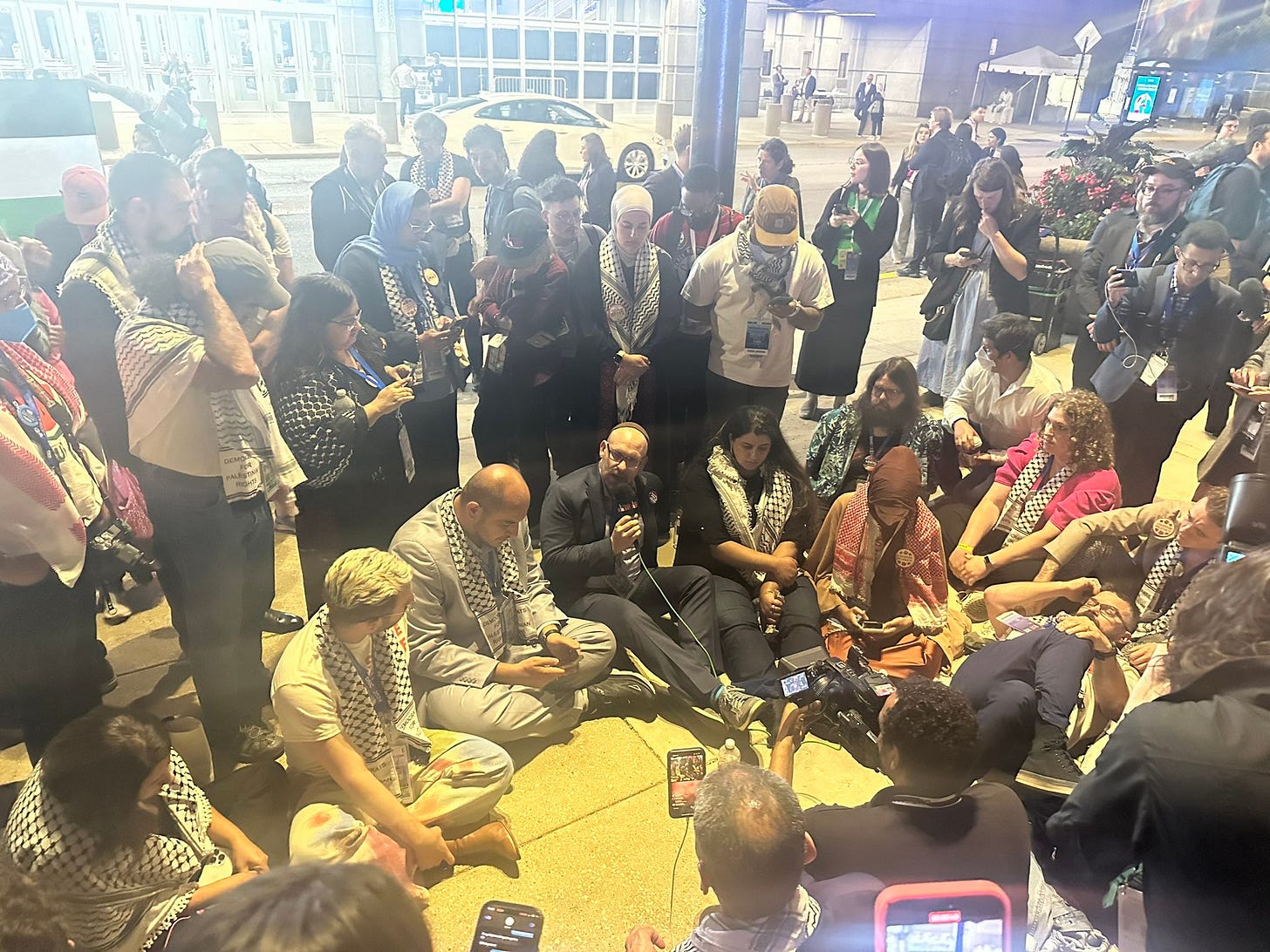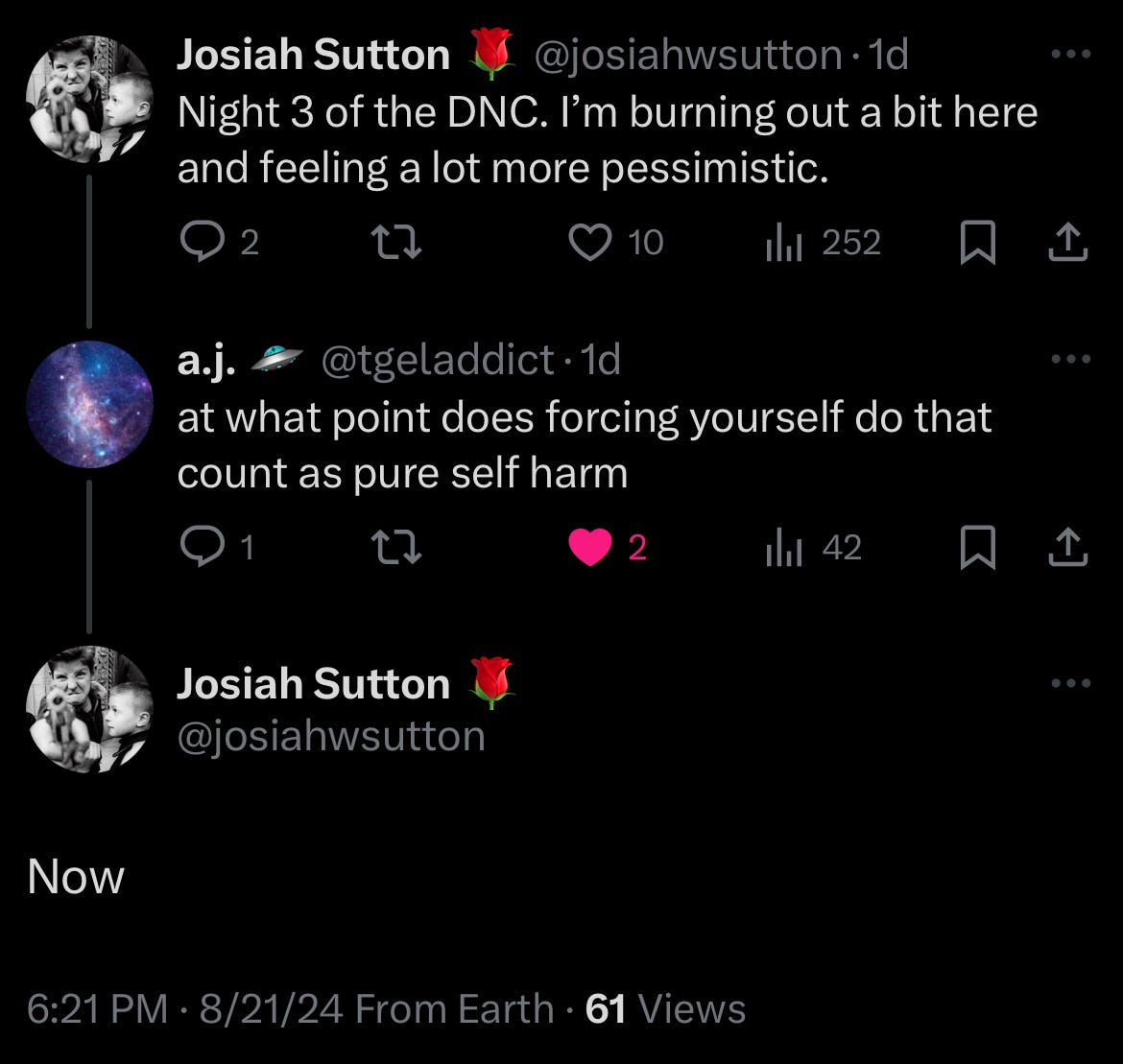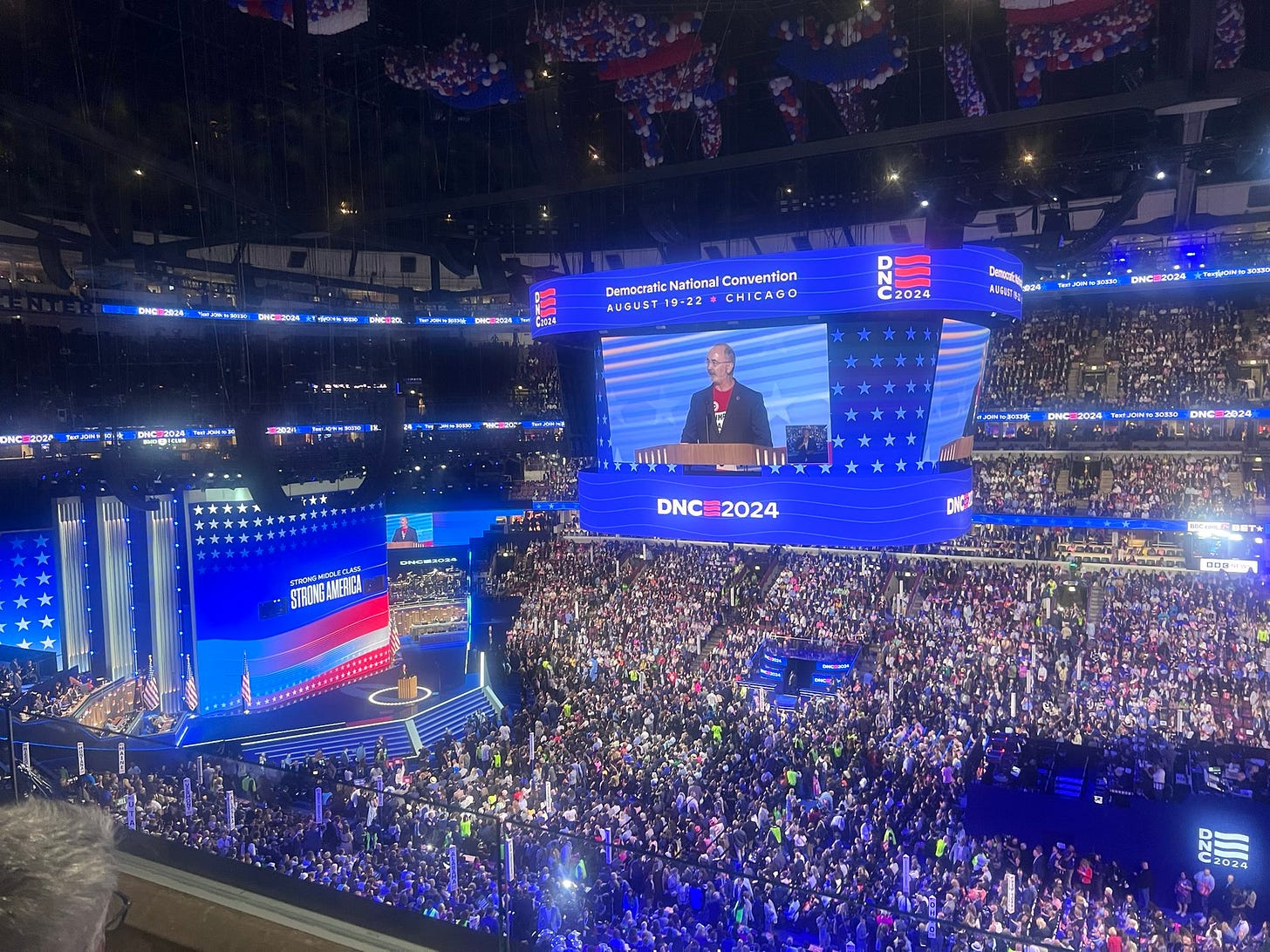I didn't learn to love the DNC
But I love Estorvo
I’m going to start this how I always start these and say, “I’m tired.”
Last Sunday, I went to the Iowa State Fair with Kelli. It was, as the fair always is, an equally miserable and fun experience—miserable in that it’s hot, crowded, and requires a lot of walking, fun in that I saw some rabbits and ate a bunch of deep fried shit.
Also, here’s a big pumpkin.
Aside from the fair, though, this week has almost entirely been devoted to keeping up with the Democratic National Convention (DNC). I have that specific brainworm where I feel the need to watch these things despite not having any sort of writing job that forces me to do it—I can lie and say I “have” to do it because I talk and write about politics, but let’s be honest, watching these conventions is more self-harm than anything.
I’m not going to go into as much depth with the DNC as I did the RNC, but I will say that I had something of the opposite emotional reaction— I “learned to love the RNC” by the end because of how much of a joke it was. Toward the beginning I was horrified realizing how much more explicitly fascist the party had become, but by the end I was laughing realizing that they had also become more impotent and unlikeable.
On the other hand, I started the DNC in a bit of a good mood and was pleasantly surprised by a lot. By the end, I was back to feeling pretty cynical and incredibly angry at this party. The Democrats are uniquely able to piss me off because they are—in theory—the “good guys.” Republicans are ghouls, and I went into the RNC knowing that. They can only scare me by acting more ghoulish or more competent than usual. Democrats represent this alternative to fascism, and last night the convention showed that the only electoral alternative to fascism is a hawkish foreign policy and a militaristic border policy wearing a union hoodie, wrapped in a Pride flag, chanting civil rights slogans and trying to claim the memory of activists that the party actively hated.
I’m pretty depressed about it all. But I’ve been listening to the Brazilian punk band, Estorvo, and that’s been making it better. You should listen to Estorvo.
Welcome to the media round-up, where I (Josiah) tell you about everything I’m watching, reading, listening to, and producing.
New from me
Last week I mentioned that I did an episode of Fruitless with Caleb and Jackal about Supernatural. I released that on Monday, and you can find it here.
Last night I recorded an episode of Fruitless about The Righteous Gemstones with James C. Liker and Josh Christianson that should be out sometime next week. Keep your eyes peeled for that.
The DNC
This felt like an important DNC.
Maybe that’s just because this election has felt particularly historical—a political candidate was almost assassinated, the Democrats broke precedent and pushed out Biden at the last minute for a younger candidate, and over the course of a month, an election that seemed completely lost suddenly had life injected into its veins.
American liberalism has been reimagining itself for the past few years. After the shocking loss to Trump in 2016, liberalism entered a bit of a crisis. It was clear that antidemocratic forces were bubbling up in the country from the right, and some Democrats seemed to recognize that these conditions were the byproduct of the neoliberal consensus. Globalization lead to the closure of factories, devestating a lot of rural communities; the 2008 financial crisis lead to a stagnation in wages. People were mad, and Trump seemed to expertly play off those economic insecurities by scapegoating migrants and minorities in the country, while intending to keep the economy mostly the same.
Obama was the last great politician of the neoliberal consensus—similarly using rhetoric of hope and change while mostly representing the continuation of neoliberal economic policies. Even our first attempt at a real healthcare system in this country was market-based. But after Trump’s victory, and Bernie’s popularity in 2016 and 2020, there seemed to be a sense that American liberalism might be moving toward something vaguely more Keynesian—maybe, if we could dream, something resembling FDR’s liberalism.
When Biden entered office at the beginning of 2021, with an attempted coup to really kick the new administration off, there was a general attitude that he might represent this new path for liberalism. He was much more dove-ish on foreign policy—he pulled us out of Afghanistan, despite the unpopularity of this decision—and he was pushing for some modest (but not entirely unsubstantial) economic and infrastructure reforms. Things were maybe on the right path.
By the end of his administration, though, Biden’s name had become synonymous with the genocide in Gaza, and his tepid economic reforms and gestures at labor rights weren’t enough to keep people very invested. Biden seemed to believe that he had won in 2020 because people genuinely liked him and not because they were really sick of Trump. Things felt bleak at the beginning of the year: a candidate no one wanted, a genocide that most people don’t support, and a sense that the party of stagnating. We had our burst of life, Biden stepped down, Kamala ascended, and for a brief month, myself and others started to hope that maybe the Democrats were becoming something new.
This momentum and excitement has felt good. Kamala is a better candidate than Biden, for sure, and there were rumors she’d be easier to pressure on Gaza. As the weeks continued, however, this was starting to look less and less like the case. Despite the excitement remaining, I started to feel a bit suspicious of it all. This politics of good vibes and calling the right “weird” was all well and good—but where’s the actual politics?
In light of this context, the DNC felt important this year. This was the party saying what it planned to do with this momentum. It was going to show off this evolution in American liberalism and crystalize it into one package. This was the party’s statement about what their post-neoliberal form would be. So what’s their new form?
Let’s say the good stuff first: the Democrats are more openly pro-labor than they were in the past. Shawn Fain of the United Auto Workers gave a speech, and numerous other union leaders made appearances that first night. There was a lot of gesturing toward the legacy of the Civil Rights era, in part because of the candidate being black this year. Alexandria Ocasio-Cortez’s rhetoric was populist, and she talked a lot about service workers. On top of this, the DNC tackled the stuff they’re usually good about well—gay right, reproductive rights, etc.
But there was an elephant in the room for the whole convention. Anyone who gave the slightest reference to this elephant would get a ton of applause, and yet no one said anything particularly substantial. Outside, protestors clamored about the obvious absence. There was very little talk of Gaza.
A handful did. AOC provided a boilerplate and cowardly line about how Kamala is working “tirelessly for a ceasefire.” Bernie was a little more forceful, saying we need to “end this horrific war in Gaza. Bring home the hostages and demand an immediate cease-fire.” Embarrassingly, Joe Biden himself probably gave the best statement on this, saying, “The protestors outside have a point.” This coming from the man enabling it, which should be an embarrassment to the progressives in the party.
On the third night, the family of one of the hostages in Gaza spoke, and even they showed more sympathy toward the Gazans, calling for an end to the war, than the rest of the convention.
Each night, the protests got larger. It was night three that I started to feel really depressed.
In The New Republic, Blaise Malley wrote a short piece about the Democrat’s platform for 2024. This platform made it apparent to those paying attention to the actual policy being suggested by the DNC that the momentum and excitement right now is, on some level, laundering a real return to War on Terror foreign policy. The shift in 2020 away from support for forever wars had been reversed—the platform even castigates Trump for being too “soft on Iran.”
Outside, the Uncommited Movement had been trying to negotiate some very simple concessions from the Harris campaign. One of these very simple demands was to have a vetted Palestinian speaker provide a vetted speech. On Wednesday, Harris’ campaign informed them that even this incredibly milquetoast concession would not be granted and offered them another private meeting. Angry, the Uncommited Movement did a sit-in outside the DNC.

As Democrats left the convention at the end of the night on Wednesday, protestors read the names of Gazan children that had been killed by the IDF. Some Democrats joined the protestors, but a lot walked by covering their ears, some even mocking the protestors. “18 years old,” one man said while laughing, mockingly repeating the age of one of the victims being listed.
So on night four, there was a dark cloud hanging over the whole thing for me. With each speaker, I thought, “We could have this guy, but we can’t have a single Palestinian.” Denunciations of the convention rolled in.
The shortlived group “Muslims for Harris-Walz” disbanded in response to the decision. The United Auto Workers denounced the decision. Mayor of Chicago, Brandon Johnson, denounced the decision. Meanwhile, on stage, the DNC got speeches from yet another Republican as well as one from Obama-era Secretary of Defense and CIA director, Leon Panetta. The campaign and party have made themselves clear: Palestinians are subhuman to them, and the party platform is planning to explicitly embrace a hawkish foreign policy.
Harris spoke at the end of the convention, and she made her statement on Gaza, which was the exact line that the Biden administration has used. Don’t allow the press to gaslight you on this; while they keep writing that she was more forceful and gesturing at a change in the U.S.’s stance on Israel, it was almost word-for-word the same thing that Biden had been saying. Go look up any statement from the administration, and you’ll see it. At this point, statements on Gaza are insufficient unless they explicitly call for an arms embargo. Anything aside from that is just rhetoric—all thoughts and prayers.
So here we are. The honeymoon is over. The new Democratic party is moving in a regressive, pro-war direction, while laundering this position with more gestures toward labor rights and economic reforms. They’ve made it clear where they stand.
And while the DNC continues to reference concern for the hostages, it’s worth it to glance at what is taking place in Israel right now. The Israeli right has turned on the hostages and their families because they’ve been demanding a ceasefire. Some of the families, as a part of their campaign for a ceasefire, had placed junk cars on the side of the a major highway, painted yellow to remind drivers of the captives. These cars have been defaced, spray painted with “Total victory.” On a bridge in Tel Aviv, text scribbled on railing says, “Most of the hostages are left-wing activists” and “A year ago kibbutzim in the Gaza Envelope raised a Palestine flag on their gate next to the Israel flag. Most of them are antisemites and racists.”
Noa Argamani, one of the hostages that was released, is denouncing Israeli media for falsely claiming the injuries she had sustained were from Al-Qassam members beating her, when she had explicitly stated that her injuries came from a wall collapse from an Israeli airstrike. "I am a victim of the October 7th attack,” she writes on Instagram, “and I cannot be a victim again to the Israeli media."
I bring up the hostages at this moment not to distract from the absolute carnage of Palestinian children—and the images from Gaza that I will never get out of my head—but to show that this notion that the war is in defense of the hostages is a complete lie. The hostages want a ceasefire and an end to the carnage. This was never about them. This has always been an excuse for genocide.
And last night the Democrats confirmed their plans to keep handing weapons to the genocidaires.
Music
I’m not sure how to move to this subject without it being some upsetting tonal whiplash, but I do want to briefly talk about Estorvo. As I said earlier, while I’ve been pretty depressed by all of this throughout the week, one thing that’s been a highlight has been this band.
I mentioned them in passing last week because I’d only heard one or two of their songs, but over the course of the week, the handful of songs they’ve released have wormed their way into my head. If you’re into punk or hardcore, I cannot recommend these guys enough.
Right now, they have three singles on Spotify, which are all really great, and they plan to have an album out soon. On Twitter, the guitarist for the band sent me a short sample of an unreleased song. I’m really excited for this album.
So do yourself a favor and take some time to check their stuff out. My current favorite of their singles is “Neo Apartheid,” but “Falsa Inocência” is a strong contender, and “Roda de Rato” is fantastic.
On that note, I’ll see you next week.






